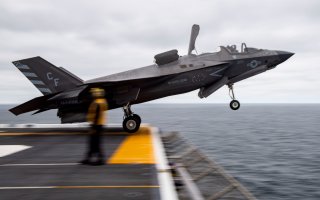Why the U.S. Military Might Not Win a War Against China Easily (If At All)
What would happen if the United States and China were to come to blows?
What would happen if the United States and China were to come to blows?
At least one former top military official believes that if a war between the United States and China were to break out, the outcome would not be as clear-cut as many people might think.
Admiral James Stavridis, formerly the Supreme Allied Commander of NATO and the former Dean of the Fletcher School of Law and Diplomacy at Tufts University, argues that while the United States retains an overall military advantage over China, the gap is narrowing and is likely to continue to do so in the years ahead. And while Admiral Stavridis notes that predicting the outcome of a military conflict requires a deep assessment of a wide range of factors, he points to some key areas which suggest that a military showdown between the United States and China would be a close call.
Regarding defense budgets, for example, Admiral Stavridis notes that while the United States’ defense budget is substantially larger than China’s – $733 billion to roughly $212 billion – those numbers obscure the fact that China is not burdened with the expense of an all-volunteer military or with managing security challenges on a global scale. China is instead free to focus the bulk of its military spending on preparing for a conflict in East Asia, the most likely sight for any conflict between the United States and China; China’s geographic proximity to a likely battlefield also serves as a potentially significant advantage with regards to ease of supply.
China also has a quantitative advantage in some key areas, such as the total number of warships, even as the United States maintains a qualitative edge – though this too is beginning to change as China fields increasingly capable warships. China is also likely to continue to make strides in other domains that will be central to any conflict between it and the United States, including in the air, with China set to deploy a number of advanced warplanes in the coming years.
Indeed, the Department of Defense has assessed that China has made significant progress – in some cases even achieving parity with or surpassing the United States – in some areas in accordance with the country’s stated goal of becoming a “world-class” military by 2049, including in overall shipbuilding capacity, air defense capabilities, and in its development of an extensive arsenal of land-based ballistic and cruise missiles.
China has also taken steps to nullify certain U.S. advantages, such as developing an array of capabilities designed to destroy or degrade the critical space assets upon which the U.S. military relies.
China has, as well, continued to carry out far reaching military reforms that extend beyond modernization efforts, including the creation of new joint theater commands and the establishment of new organizations dedicated to logistics and the operation of critical enabling technologies such as space and cyber assets. Fully implementing and perfecting these reforms remains a work in progress, but over time they will likely continue to help the Chinese military mold itself into a more effective fighting force.

